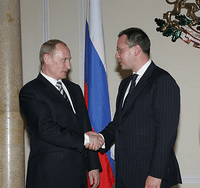On May 8, the Czech Republic hosted a long-awaited Nabucco Summit under the auspices of its European Union (EU) presidency. Notably, the meeting convened just as the Bulgarian government finalized its participation in Russia's competing South Stream pipeline. A little-noticed element of the negotiations in Moscow, however, was Bulgaria's effort to link its participation in South Stream with Russian financing for a domestic nuclear power program. Pipeline politics may generate headlines, but Bulgarian officials expect nuclear power to generate most of their future electricity. And Bulgaria's South Stream agreement demonstrates the perverse incentives which arise when EU energy security and environmental policy collide.
As one of the few countries in Europe to rely exclusively on Russian natural gas imports, Bulgaria was exceptionally hard hit by the 2009 gas crisis. The January shut-off focused international attention on the country's alarming dependence on Russia and briefly prompted the Bulgarian parliament to consider restarting its mothballed Soviet-era reactors. While this would have violated the country's EU accession agreement, the move underscored Bulgaria's long-standing preference for nuclear power as the linchpin of energy independence.
Unfortunately, the global financial crisis could not have come at a worse moment for Bulgaria's nuclear ambitions. When the state-owned National Electricity Company first announced plans in 2005 to build two 1,000-megawatt light-water reactors near the town of Belene, Bulgaria was riding high on a wave of rapid GDP growth, easy credit and large foreign capital inflows. Over the last eight months, however, the country has experienced a dramatic reversal of fortune. Foreign investors have soured on Central and Eastern Europe, forcing the Bulgarian government to approach the Kremlin as a lender of last resort for the Belene project.

